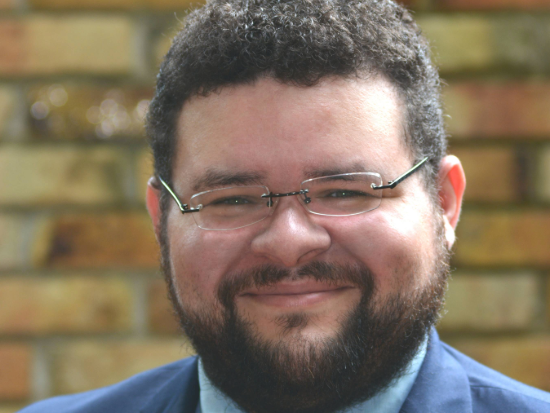 Cortez Bowlin, Ph.D., under the mentorship of Michael Gray, Ph.D., associate professor in the UAB Department of Microbiology, has been appointed for the 2024-2025 Dr. Louis Sullivan Science Policy Fellowship at Research!America.
Cortez Bowlin, Ph.D., under the mentorship of Michael Gray, Ph.D., associate professor in the UAB Department of Microbiology, has been appointed for the 2024-2025 Dr. Louis Sullivan Science Policy Fellowship at Research!America.
During his fellowship, Bowlin will concentrate on enhancing advocacy initiatives to achieve health equity, fostering collaborations across sectors to promote diversity within the STEM workforce, and partnering with HBCUs and other minority-serving institutions to elevate their presence in medical research across the United States.
“Cortez’ achievement reflects the broad and well-rounded education that students receive in our department,” said J. Victor Garcia-Martinez, Ph.D., professor and chair. “His continuous desire to understand the ‘why’ behind everything is inspiring to all of us. We all are very proud of his significant achievement and look forward to his continued success. “
The UAB Heersink School of Medicine communications team contacted Bowlin to discuss health equity and discuss the details of the fellowship opportunity.
What inspired you to apply for the Dr. Louis Sullivan Science Policy Fellowship?
Bowlin: I have a deep passion for science. I enjoy the puzzling and reasoning necessary to translate random observations into actionable experiments and hard data. However, while in academia, I realized that while many scientists are exceptionally skilled at conducting and presenting research in a scientific setting, too few are gifted in translating that to policymakers and the public.
That is problematic because these individuals control funding and directly benefit from our research. Fortunately, I have a knack for making complex science more approachable. When I discovered that there was a field dedicated to science-focused policy work, I decided to explore my options. I found the Dr. Louis Sullivan Science Policy Fellowship through a Google search.
After learning about it and Dr. Sullivan, I felt a strong connection to the work due to the similarities between Dr. Sullivan’s story and mine. We both come from rural backgrounds and share a passion for science. Dr. Sullivan’s struggle during the Jim Crow era continues today in the inherited disparities caused by the “separate but equal” philosophy. I want to be part of addressing and rectifying those disparities.
Can you elaborate on your primary goals during your tenure as a fellow?
Bowlin: I aim to establish connections to become an effective science policy advocate. Research!America excels in this field, working with federal officials, facilitating cross-sectional discussions, and organizing weekly policy development meetings for member organizations. Learning from their successful science policy work is my key objective during this fellowship.
One aspect of my fellowship involves developing a project aligned with Dr. Louis Sullivan’s mission. My current focus is on the STEMM Opportunity Alliance (SOA), a nationwide initiative to improve equity in STEMM access, participation, and benefits by 2050. Their strategy, released in May, includes increasing STEMM education in K-12 and minority participation in STEMM fields.
I am contributing to their Innovation pillar, which aims to increase minority participation in research. I aim to develop metrics to measure and report progress on their key milestones, such as increasing federal research funding access for minority and marginalized researchers. This involves creating tools to gather, measure, and process relevant data, including grant amounts and the cultural and ethnic backgrounds of principal investigators.
How did your educational journey shape your interest in science policy and health equity?
Bowlin: I come from a poor, rural region of southwest Mississippi where science education was never a priority. It was an afterthought for generations, treated as an impractical, uninteresting subject. When I began my education, science courses were outdated and lacked hands-on experience. We rarely had lab days; when we did, they were minimal.
Despite these challenges, I pursued a career in science, earning a Ph.D. in microbiology and am working to advance scientific research and improve health equity. However, few of the nearly 80 students in my senior year pursued science-related careers due to the lackluster science education we received. This issue disproportionately affects students in marginalized rural areas, perpetuating inequality.
For instance, Mississippi faces a shortage of medical providers, significantly impacting health outcomes. In 2021, the state’s infant mortality rate was almost double the national average, with over 80 percent of pregnancy-related deaths in 2020 being preventable with adequate care. Minority women were four times more likely than Caucasian women to die from pregnancy-related issues. Fifteen years ago, my graduating class could have helped fill these critical gaps, but inadequate science education hindered us. This issue persists in rural areas, entrenching deficiencies and perpetuating disparities.
My grandfather, a general contractor, taught me that you can't build a good house on a bad foundation. Science education is that foundation, and addressing disparities requires building on it. Engaging in science education encourages students to pursue science careers, leading me to focus on science policy work.
In your opinion, what are the key challenges to improving health equity?
Bowlin: Understanding the drastic health disparities in our country requires considering many factors. One issue is the societal tendency to ignore plain facts, such as the quadruple rate of pregnancy-related deaths for minorities in Mississippi. Culturally, decades of mistreatment have fostered distrust toward health care professionals in minority communities.
Additionally, accessibility issues—whether financial or physical—prevent engagement in health-focused activities. These problems often stem from a lack of engagement in the benefits of STEMM-related fields.
This brings us back to holistic science education. Increasing STEMM education access in K-12 and beyond can transform the future for generations of students. Quality STEMM education opens doors to more careers and opportunities, enabling students to become nurses, doctors, researchers, and advocates in their communities.
Adult access to STEMM educational resources is also crucial. Adults can benefit from participating in citizen science events, engaging with children in STEMM education, and learning about their own health and well-being. Effective communication of these benefits is essential.